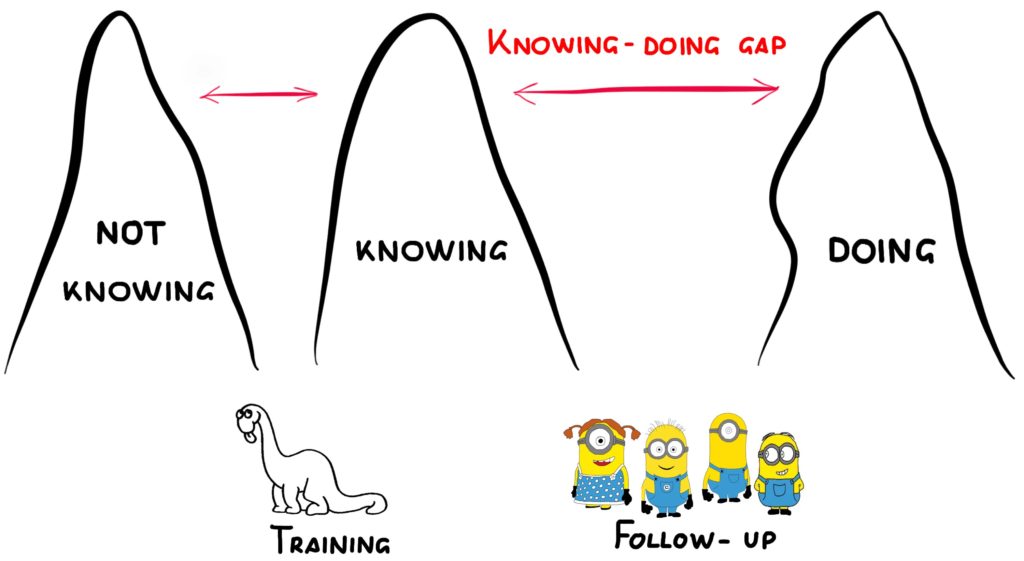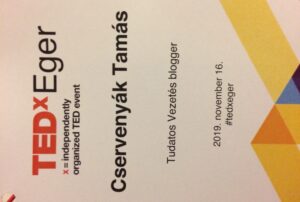These efforts – even if they are well-intentioned – have poor results in leadership performance improvement. Leaders can only turn 15-20% of their knowledge into actionat best.
Most leadership development programs revolve around a false assumption: if leaders understand, they actually do it.
If we feel the lack of some knowledge, information or something is not going well, we have an intrinsic drive to bridge that gap. However, the gap we experience is actually two gaps.
The smaller one occurs if we lack some knowledge. To eliminate this “not knowing – knowing gap”, training can be a good solution. If we attend a training program and there is no change experienced in our behavior or habits afterwards, the problem may be the second, bigger gap between “knowing and doing”. Unfortunately, training is a poor solution here, because we already have the knowledge, but we struggle to apply it in practice and follow-up.
I have concluded a simple and very straight process how leaders change.
4 Steps of Leadership Development:
1. Ask questions
2. Learn
3. Follow-up
4. Develop
1. Ask questions
Leaders’ dilemmas normally come in the form of questions, e.g.: “How can I keep my team motivated?” or “How can I make a good performance review with my colleague?” Act2Manage App provides help when and where you need it, not when a training is to be organized. It is also a good advisor for you to formulate the right questions.
2. Learn
You can be extremely efficient: micro-learning enables you to get practical suggestions for your dilemmas in less then 3-5 minutes. Willingness to learn gets improved if you have fun while using the app. Various gamified elements (e.g.: quizzies, points, badges, challenges, etc.) ensure that you find the process entertaining.
3. Follow-up
People who miss the follow-up are not necessarily bad managers, they are just not getting better. Follow-up is the most exciting part of the application because it turns you to a super doer. The micro-learning units have a set of follow-up tips you can choose from. Naturally, you can also word your own commitments and the application will help you accomplish.
4. Develop
Whatever the leader actually does at work has more significant impact on subordinate behavior, than any learning activity.
Our experience says that the rewards you receive motivate you to regularly take the application out of your pocket. More importantly, these online rewards can be integrated with company reward systems in order to further facilitate engagement and learning.
We asked Zoltán Mitták, Audit Senior Manager, Head of Audit Trainings at KPMG in Hungary to describe his experience with Act2Manage application.
Why did you decide to implement Act2Manage app at KPMG?
We placed greater emphasis on developing the leadership skills of middle managers during the past few years at KPMG in Hungary’s audit practice. We worked together with the founders of Act2Manage app in various in-house programs, and they came across as highly committed leadership development professionals. This provided a sound basis for further cooperation. We tested the application for several months. The main reasons why we decided to implement the app were its user-friendly design, the straightforward language and style that fits our company culture, and its features that support self-development and follow-up.
What did you find the most useful in the application?
Each course and learning module focuses on the essentials, therefore they can be easily and quickly completed. Specific commitments ensure that the newly learnt content will be built into our everyday management practice.
Who would you recommend Act2Manage?
I would recommend it to all companies that are open to novel approaches and find it important to develop their managers continuously. It would be especially useful for organizations where classroom trainings are difficult to organize. With Act2Manage everyone can learn and plan development activities at his or her own pace.






